Archives Hub feature for March 2023
In 1983 the government allocated the papers of Arthur Wellesley, first Duke of Wellington, the long serving politician and the premier soldier of his generation, to the University of Southampton under national heritage legislation. The collection arrived on 17 March of that year. This brought to Southampton the University’s first major manuscript collection, leading to the creation of an Archives Department and the development of a major strand of activity within the University Library.
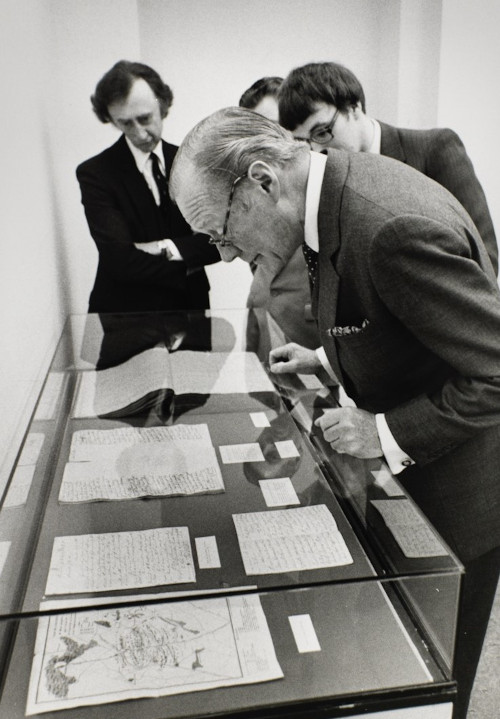
Composed of around 100,000 items that cover the Duke’s career as a soldier, statesman and diplomat from 1790 to his death in 1852, the collection bears witness to great military, political and social events of the time. It is exceptional among the papers of nineteenth-century figures for its size and scope.
Wellington’s time in India, 1798-1805, when he made his fortune and his name as a military commander, is well represented by three series of letter books, the first two series arranged chronologically, with the third, covering 1802-5, arranged by correspondent. The sections for the Peninsular War (1808-14) and for the Waterloo campaign provide an unrivalled source for the history of British participation. The collection also includes Wellington’s correspondence and papers for the congresses at the end of the Napoleonic wars and the allied occupation of France, 1815-18, a period when Wellington was a major player on the European political scene.
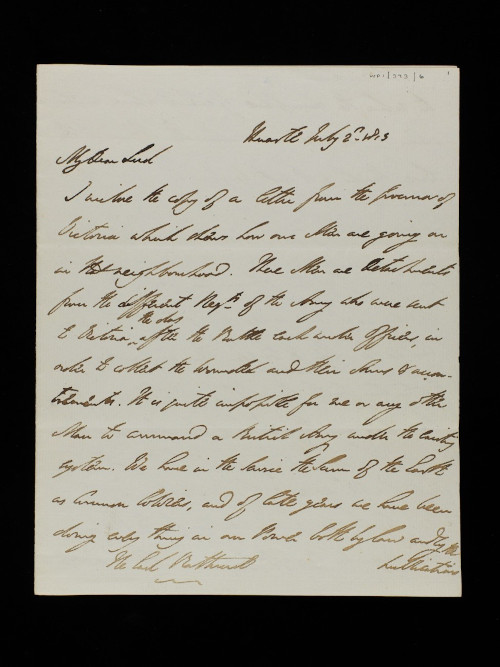
Wellington was involved in politics throughout his career, serving as an MP in the Irish parliament in the 1780s onwards and as Chief Secretary for Ireland, 1807-9. There is considerable material for his political career post 1818, including two times as prime minister, as well as for his role as Lord Lieutenant of Hampshire and as Commander in Chief of the Army. Amongst the extensive number of cabinet papers, drafted in the Duke’s own hand is the memorandum written by Wellington and Peel setting out the details of the Catholic emancipation act of 1829. Material from his tenure as Lord Lieutenant of Hampshire includes death threats from Captain Swing dating from the Swing riots around the southern counties of England.
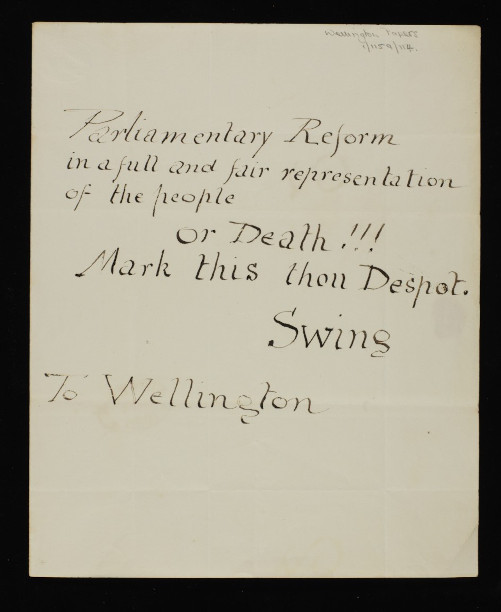
As the archive is from the great age of government by correspondence, as well as coinciding with a wider revolution in communication, it contains material from a wide cross section of society. Everyone wrote to the Duke of Wellington, offering the national hero their views on a whole range of subjects, asking for patronage, promotion or assistance, wishing to dedicate their works to him, or asking him to be the godfather of their children or to be allowed to name them after him. In response to one letter, Wellington noted with his usual acerbic wit the inconvenience of calling all boys born on his birth by the name “Arthur”.
The arrival of the Wellington Archive in 1983 was significant in another way in that it marked the beginning of Southampton’s long involvement in automated archive catalogues. The Wellington Papers Database could claim to be one of, if the not the earliest, online archive catalogue in the UK. Investigations into a system to support this were already underway in December 1982, prior to the arrival of the papers. In July 1983 the University decided to develop a manuscript cataloguing system using STATUS software and it was in use for cataloguing material early the following year. The cataloguing was done “offline” by the archivists on BBC microcomputers equipped with rudimentary word-processing packages – but no memory – and all text was saved onto floppy discs. It was subsequently transferred to an ICL mainframe computer for incorporation into the database by batch programme. This being the days prior to the WWW, the initial database was made available by the Joint Academic Network (JANET) and the public switched telephone network. It was initially scheduled to be made available 156 hours a week, rising to 168. In 2023 the catalogue of the Wellington Archive can be accessed in the Epexio Archive Catalogue, a new system that we launched in November 2021.
The collection also came with a major conservation challenge – some ten percent of the collection was so badly damaged it was unfit to handle and in a parlous state. Considerable progress has been made in addressing this. Important material is now available for research, including for the Peninsular War, papers for 1822 (for the Congress of Verona) and for Wellington as Prime Minister in 1829. The badly degraded and mould-damaged bundles from 1832, significant as the time of the First Reform Act, are available for the first time since 1940.
The last forty years also has seen a great deal of outreach and activity focused on the Wellington Archive. As well as research and teaching sessions, drop-in sessions, events and exhibitions, the Archives Department has arranged six international Wellington congresses. In 2015 and 2017 Karen Robson and Professor Chris Woolgar presented a MOOC they had co-created relating to Wellington and Waterloo. And since 1989 there has been the annual Wellington Lecture with speakers or presenters ranging from Elizabeth Longford to Martin Carthy.
To mark Wellington 40 this year we shall be running a number of events. Follow our social media campaign in March, join us for exhibitions in June/July and October and perhaps take part in the open day event in July: https://www.eventbrite.co.uk/e/wellington-papers-40-behind-the-scenes-at-the-archives-tickets-528206288227?aff=ebdssbdestsearch
Karen Robson
Head of Archives and Special Collections
University of Southampton Library
Related
Wellington papers, mid-late seventeenth century, 1790-1852
Browse the University of Southampton Special Collections descriptions to date on the Archives Hub
Previous features by University of Southampton
- “Those wonderful women in black” – the Women’s Campaign for Soviet Jewry
- 100 years at Highfield: stories from Southampton’s University Archives and Special Collections
- The Basque Child Refugee Archive
- 60 years of faith and conflict
All images copyright University of Southampton Special Collections. Reproduced with the kind permission of the copyright holders.

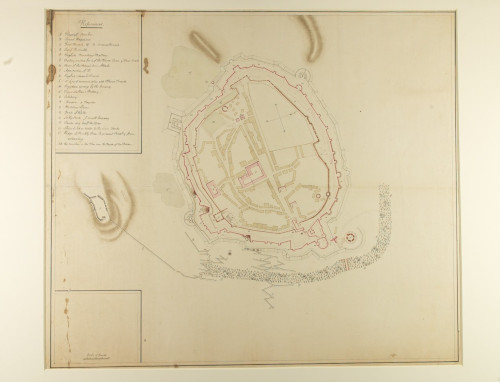
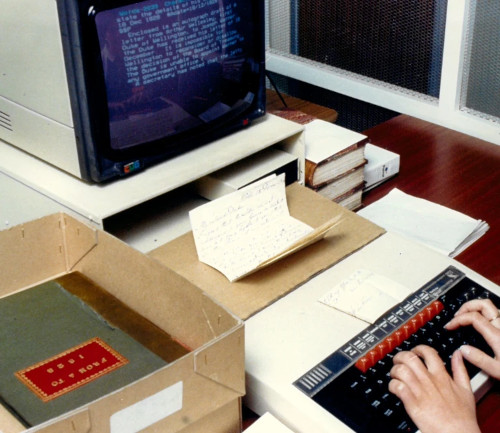

Hello, I live in Angers in France . Arthur Wesley came here in 1785 / 1786 in “Academie d’équitation ” . I’m looking for archives about this period of his life. Could you help me about that ? I’m specially interested by coorrespondence, witnesses …everything about that Between 1784 and 1786. If it’s possible to get a list of these papers in a first time, then i’ll go to Southhampton for studying them. Tanks à lot for your help Philippe Thellier.
Hi Philippe, you’ll need to contact University of Southampton directly about their collections: their email is archives@soton.ac.uk and full details about the repository and their collections can be found here https://www.southampton.ac.uk/archives/.